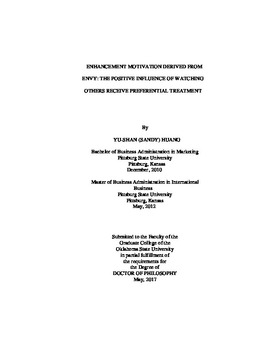| dc.contributor.advisor | Brown, Tom J. | |
| dc.contributor.author | Huang, Yu-Shan (Sandy) | |
| dc.date.accessioned | 2018-04-23T19:35:24Z | |
| dc.date.available | 2018-04-23T19:35:24Z | |
| dc.date.issued | 2017-05 | |
| dc.identifier.uri | https://hdl.handle.net/11244/299517 | |
| dc.description.abstract | As a strategy to build loyal relationships with highly profitable customers, the practice of customer prioritization has been widely adopted by a variety of firms in service industries. Although prior research has shown there is value creation in allocating more resources to prioritized customers, nonprioritized customers were found to respond negatively to this practice. Given that unhappy customers can be costly to a firm and that it is common for a firm to have some desirable customers who are not in the position of receiving preferential treatment, it is important to investigate how to encourage positive responses from nonprioritized customers. In the current research, I aim to address this issue by drawing on social comparison theory. In particular, I propose that in the case of watching other customers receive preferential treatment, customers are likely to feel the emotion of envy toward the preferentially treated customers. The revenge motivation resulting from this envy can drive the unfavorable response of negative word of mouth, whereas the self-enhancement motivation derived from the envy can bring about the favorable response of program participation. The boundary conditions of rule knowledge and attitudinal loyalty were identified. Two studies were conducted to examine the proposed research. The first study experimentally manipulated preferential treatment and knowledge of reward program rules using video-based scenarios (N = 303). The second study investigated the complete conceptual model with a field study of hotel customers (N = 529). Across the two studies, two double-mediation paths were confirmed, but a moderating effect of rule knowledge and attitudinal loyalty was not found. Follow-up analysis suggested the potential moderator role of rule appropriateness. The research contributes to a growing body of knowledge about envy, customer prioritization, and social comparison. It also provides recommendations for marketing practitioners with respect to managing customer prioritization practices to build long-term relationships with customers. | |
| dc.format | application/pdf | |
| dc.language | en_US | |
| dc.rights | Copyright is held by the author who has granted the Oklahoma State University Library the non-exclusive right to share this material in its institutional repository. Contact Digital Library Services at lib-dls@okstate.edu or 405-744-9161 for the permission policy on the use, reproduction or distribution of this material. | |
| dc.title | Enhancement motivation derived from envy: The positive influence of watching others receive preferential treatment | |
| dc.contributor.committeeMember | Arnold, Todd J. | |
| dc.contributor.committeeMember | Voss, Kevin E. | |
| dc.contributor.committeeMember | Wang, Cynthia | |
| osu.filename | Huang_okstate_0664D_15215.pdf | |
| osu.accesstype | Open Access | |
| dc.type.genre | Dissertation | |
| dc.type.material | Text | |
| thesis.degree.discipline | Business Administration | |
| thesis.degree.grantor | Oklahoma State University | |
